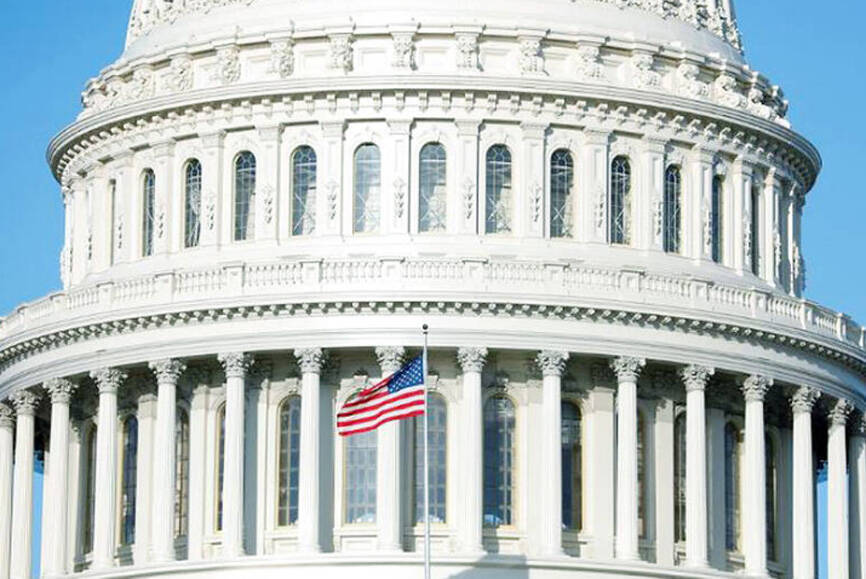Five US representatives on Friday called on US Secretary of State Antony Blinken to not impose conditions on President William Lai (賴清德) should he make a stopover in US territory during his trip to the South Pacific.
The representatives also urged US President Joe Biden to “consider meeting personally with Mr Lai during his visit.”
The letter was signed by US representatives Tom Tiffany, Andy Ogles, Chris Smith, Scott Perry and Lance Gooden about a week before Lai is scheduled to make his first official overseas visit since taking office on May 20.

Photo: Reuters
Lai is to travel to the Marshall Islands, Tuvalu and Palau from Saturday to Dec. 6, although the Ministry of Foreign Affairs has declined to confirm whether he and his delegation would stop over in US territory.
Plans for Lai’s transit during the South Pacific trip “are still being finalized,” Deputy Minister of Foreign Affairs Tien Chung-kwang (田中光) told a news conference in Taipei on Friday.
In their letter, the five representatives said that Blinken should “refrain from imposing arbitrary conditions” on Lai should he make a transit stop in the US, such as restricting his interactions with journalists or limiting his ability to conduct public engagements.
No US law concerning ties with Taiwan “call for prohibitions or limitations on visits by high-ranking Taiwanese officials, including their duly elected president,” they said.
“In fact, the contrary is true: Our statutes explicitly guarantee that Taiwan’s president ‘shall be admitted’ to the US for discussions with American officials, and make it the policy of the United States to expand such high-level visits in the future,” the letter said.
They also criticized Beijing’s calls on Washington to block a potential stopover by Lai in the US as “outrageous and unacceptable,” adding that interference in US internal affairs “should be forcefully and publicly rejected.”
They were referring to comments by Chinese Ministry of Foreign Affairs spokesman Lin Jian (林劍) at a news conference earlier this month.
Lin said that China “consistently opposes the US arrangements of such transits.”
“We urge Washington to ... not allow Lai Ching-te to transit [through the US] and not send wrong signals to Taiwan independence forces,” he said.
Despite a lack of formal diplomatic relations, Washington has allowed Taiwanese presidents to make stopovers on US soil during their trips to visit Taiwan’s diplomatic allies.
Former president Tsai Ing-wen (蔡英文) traveled to the South Pacific twice during her two four-year tenures, in 2017 and 2019. Her 2017 trip included layovers in Honolulu, Hawaii, and Guam, and her 2019 trip included a stopover in Honolulu.

SECURITY: As China is ‘reshaping’ Hong Kong’s population, Taiwan must raise the eligibility threshold for applications from Hong Kongers, Chiu Chui-cheng said When Hong Kong and Macau citizens apply for residency in Taiwan, it would be under a new category that includes a “national security observation period,” Mainland Affairs Council (MAC) Minister Chiu Chui-cheng (邱垂正) said yesterday. President William Lai (賴清德) on March 13 announced 17 strategies to counter China’s aggression toward Taiwan, including incorporating national security considerations into the review process for residency applications from Hong Kong and Macau citizens. The situation in Hong Kong is constantly changing, Chiu said to media yesterday on the sidelines of the Taipei Technology Run hosted by the Taipei Neihu Technology Park Development Association. With

A US Marine Corps regiment equipped with Naval Strike Missiles (NSM) is set to participate in the upcoming Balikatan 25 exercise in the Luzon Strait, marking the system’s first-ever deployment in the Philippines. US and Philippine officials have separately confirmed that the Navy Marine Expeditionary Ship Interdiction System (NMESIS) — the mobile launch platform for the Naval Strike Missile — would take part in the joint exercise. The missiles are being deployed to “a strategic first island chain chokepoint” in the waters between Taiwan proper and the Philippines, US-based Naval News reported. “The Luzon Strait and Bashi Channel represent a critical access

‘FORM OF PROTEST’: The German Institute Taipei said it was ‘shocked’ to see Nazi symbolism used in connection with political aims as it condemned the incident Sung Chien-liang (宋建樑), who led efforts to recall Democratic Progressive Party (DPP) Legislator Lee Kun-cheng (李坤城), was released on bail of NT$80,000 yesterday amid an outcry over a Nazi armband he wore to questioning the night before. Sung arrived at the New Taipei City District Prosecutors’ Office for questioning in a recall petition forgery case on Tuesday night wearing a red armband bearing a swastika, carrying a copy of Adolf Hitler’s Mein Kampf and giving a Nazi salute. Sung left the building at 1:15am without the armband and apparently covering the book with a coat. This is a serious international scandal and Chinese

COUNTERINTELLIGENCE TRAINING: The ministry said 87.5 percent of the apprehended Chinese agents were reported by service members they tried to lure into becoming spies Taiwanese organized crime, illegal money lenders, temples and civic groups are complicit in Beijing’s infiltration of the armed forces, the Ministry of National Defense (MND) said in a report yesterday. Retired service members who had been turned to Beijing’s cause mainly relied on those channels to infiltrate the Taiwanese military, according to the report to be submitted to lawmakers ahead of tomorrow’s hearing on Chinese espionage in the military. Chinese intelligence typically used blackmail, Internet-based communications, bribery or debts to loan sharks to leverage active service personnel to do its bidding, it said. China’s main goals are to collect intelligence, and develop a